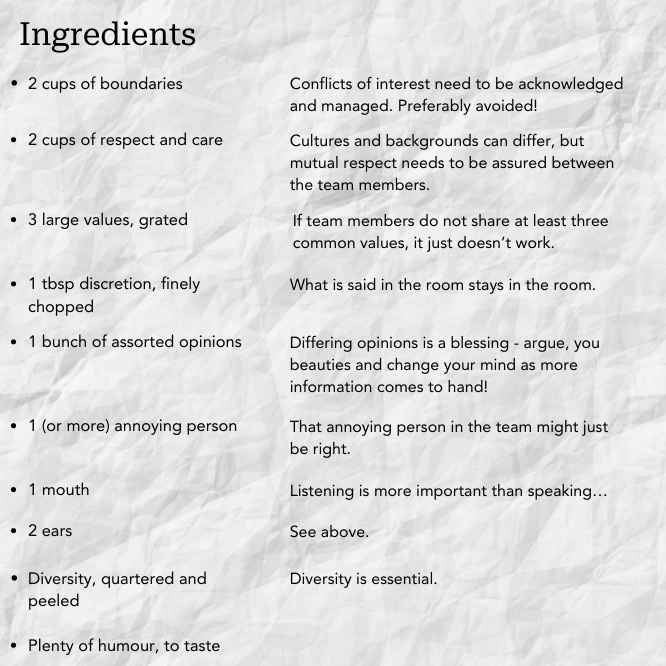Ph: 06 280 0938
Harv’s recipe for a Magic Collective Intelligence Team
by Harv, with help from Jody!
The weekend of February 25-26 I had the privilege of attending the 16th Enspiral conference in the Wainuiomata Valley, Wellington. The venue was a very rustic scout camp, surrounded by native bush, where the sound of the stream and birdsong made for wonderful ambiance.
It was also very cool to hang out with a totally different tribe and consequently I made some cool new connections during my time there.
Enspiral had a range of planned events, storytelling and lots of free time to connect, which seemed to go in a flash. Anyone could present a topic, and I chose to present and facilitate the conversation of how do we develop a trust economy, which many will know is a very present focus for me.
About 15 people turned up for my session, which was a pleasant surprise and I felt very flattered, as being from outside the Enspiral world I didn’t think it would get much attention. I had a 90 minute time slot, and didn’t want to lead the direction of the discussion too much, so instead asked for the attendees’ views on what ‘trust economy’ brought up and meant for them.
I was surprised the conversation started with a crypto lens, but then very quickly changed to a regenerative focus, and designing systems inspired by nature. By the end I felt happy that people’s imagination had been triggered as to what a trust economy / trust ecosystem (economy didn’t sit well with some) could look like. I was really happy with the quality and depth of the discussion, and that the concept hit a chord..
The other interesting aspect was that some people came to the session to meet me and learn about our work, which wasn’t the purpose of the session, so I tried to steer it away from that. However, it was clear people needed context and so I relented and gave a quick overview of Collective Intelligence.
Then later on reflection, I realised many people think they understand the magic of Collective Intelligence, and how it works. But in reality, few do.
In discussing this with Sarah Tocker (one of our facilitators) she agreed with me, and included some of our own Collective Intelligence members who don't quite get the design and methodology.
I thought I would share my go-to “recipe” for constructing a Collective Intelligence Team and setting.
So here goes…
List of Services

Instructions
Find a wide space to prepare your Collective Intelligence team. You can use Aotearoa, or you can assemble your team online instead, if your ingredients are hard to find here.
Wash, peel, chop, and otherwise prepare all ingredients listed above.
Take several deep breaths, then begin carefully kneading the mixture into a firm, safe, challenging dough.
Remember that safety provides confidence to be vulnerable, and that everything is a process, not an event. So stop looking for the magic bullet!
Once your dough is mixed, set it aside for a day or two and see what rises to the surface.
Now get yourself an industrial sized sieve, and remove:
- Any -isms that might be in it. Age, sex, race etc.
- Ego.
- Perceptions of social or professional status. These will sour your team and prevent it from rising.
- Any notions of being an expert.
Bake at 180 celcius for a few years, making sure to turn it three or four times a year.
To serve
To serve your delicious Collective Intelligence Team, we recommend that you season with vulnerability - this is where the good things grow.
Keep asking open questions, and keep your mind as open as you possibly can.
Garnish with confidentiality. Reflections can always be shared, but keep the specifics out, once your team has concluded a meeting.
Head of Table
This recipe is best eaten carefully and with good heart. So we recommend one of our range of professional Facilitators to ensure that your baking goes well. Remember, facilitation is bloody hard, subtle, and essential. Facilitators have the same rights as everyone else in the team, and a whole lot more responsibility.
They will make sure that the introverts get a chance to speak, and the extroverts remember to give that space to others equally.
They’re great at giving feedback! It’s an art form in a team, so learn, learn, learn.
This recipe is not aiming to be perfect:
However, even when it’s not perfect it still creates a great taste experience if you are taking notice.
As I’ve said, it's definitely not perfect, and often messy.
And yet - for making sense of complexity, so people can take action with wisdom, I don’t know of a better mix.
Keen to hear what ingredients others would add!

Collective Intelligence 2022 ©